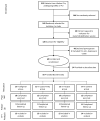Effects of Positive Psychology Interventions on Risk Biomarkers in Coronary Patients: A Randomized, Wait-List Controlled Pilot Trial
- PMID: 27129358
- PMCID: PMC4902729
- DOI: 10.1016/j.psym.2016.02.007
Effects of Positive Psychology Interventions on Risk Biomarkers in Coronary Patients: A Randomized, Wait-List Controlled Pilot Trial
Abstract
Background: Among cardiac patients, positive psychologic factors are consistently linked with superior clinical outcomes and improvement in key markers of inflammation and hypothalamic-pituitary-adrenal axis functioning. Further, positive psychology interventions (PPI) have effectively increased psychologic well-being in a wide variety of populations. However, there has been minimal study of PPIs in cardiac patients, and no prior study has evaluated their effect on key prognostic biomarkers of cardiac outcome. Accordingly, we investigated the effect of 3 distinct PPIs on risk biomarkers in cardiac patients.
Methods: In an exploratory trial, 69 patients with recent coronary artery bypass graft surgery or percutaneous intervention were randomized to (1) one of three 6-week in-person PPIs (based on the work of Seligman, Lyubomirsky, or Fordyce) or (2) a wait-list control group. Risk biomarkers were assessed at baseline, postintervention (7 weeks), and at 15-week follow-up. Between-group differences in change from baseline biomarker levels were examined via random effects models.
Results: Compared with the control group, participants randomized to the Seligman (B = -2.06; p = 0.02) and Fordyce PPI (B = -1.54; p = 0.04) had significantly lower high-sensitivity C-reactive protein levels at 7 weeks. Further, the Lyubomirsky PPI (B = -245.86; p = 0.04) was associated with a significantly lower cortisol awakening response at 7 weeks when compared with control participants. There were no other significant between-group differences.
Conclusion: Despite being an exploratory pilot study with multiple between-group comparisons, this initial trial offers the first suggestion that PPIs might be effective in reducing risk biomarkers in high-risk cardiac patients.
Keywords: HPA-axis functioning; coronary artery disease; inflammation; intervention; positive psychology; randomized controlled trial.
Copyright © 2016 The Academy of Psychosomatic Medicine. All rights reserved.
Conflict of interest statement
All authors declare that they have no conflict of interest in relation to this study.
Figures
References
-
- GBD Mortality and Causes of Death Collaborators. Global, regional, and national age–sex specific all-cause and cause-specific mortality for 240 causes of death, 1990–2013: a systematic analysis for the Global Burden of Disease Study 2013. Lancet. 2014;385(9963):117–71. doi: 10.1016/S0140-6736(14)61682-2. - DOI - PMC - PubMed
Publication types
MeSH terms
Substances
Grants and funding
LinkOut - more resources
Full Text Sources
Other Literature Sources
Medical
Research Materials


